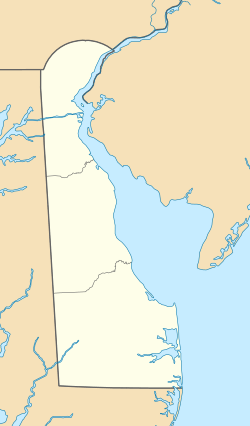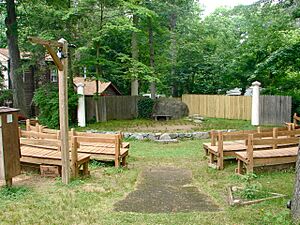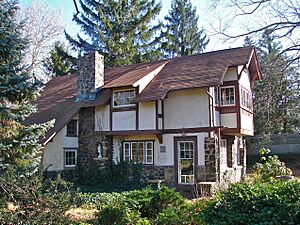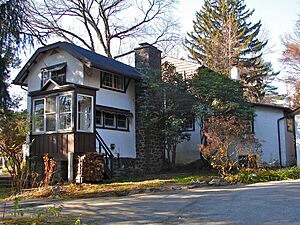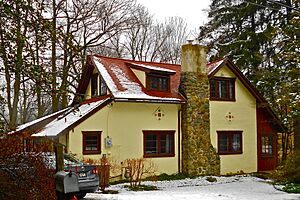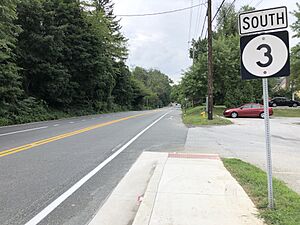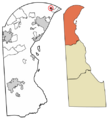Arden, Delaware facts for kids
Quick facts for kids
Arden, Delaware
|
|
|---|---|
|
Village
|
|
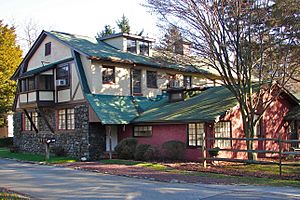
Arden Craft Shop/Museum/Archive
|
|
| Motto(s):
"You are welcome hither"
|
|

Location of Arden in New Castle County, Delaware.
|
|
| Country | |
| State | |
| County | |
| Founded | 1900 |
| Area | |
| • Total | 0.25 sq mi (0.65 km2) |
| • Land | 0.25 sq mi (0.65 km2) |
| • Water | 0.00 sq mi (0.00 km2) |
| Elevation | 253 ft (77 m) |
| Population
(2020)
|
|
| • Total | 430 |
| • Density | 1,726.91/sq mi (666.55/km2) |
| Time zone | UTC-5 (Eastern (EST)) |
| • Summer (DST) | UTC-4 (EDT) |
| ZIP code |
19810
|
| Area code(s) | 302 |
| FIPS code | 10-01400 |
| GNIS feature ID | 213569 |
Arden is a small village located in New Castle County, Delaware, in the United States. It was started in 1900 by sculptor Frank Stephens and architect William Lightfoot Price. They wanted to create a special community based on ideas like the "single-tax" system and the "Arts and Crafts" movement.
Arden covers about 160 acres, and half of this land is kept as open space for everyone to enjoy. In 2020, about 430 people lived there. The entire village was recognized as a historic place in 1973.
Two other villages nearby, Ardentown (founded in 1922) and Ardencroft (founded in 1950), were also started with similar ideas. Together, these three villages are known as "the Ardens." People who live in Arden are called "Ardenites." They often describe themselves as friendly, artistic, and free-spirited.
Contents
History of Arden Village
Arden was founded in 1900 by Frank Stephens and William Lightfoot Price. Their ideas came from different thinkers:
- Henry George and his idea of a "single-tax."
- William Morris and his "Arts and Crafts" principles.
- Peter Kropotkin and his ideas about community living.
A kind person named Joseph Fels helped fund the project.
The Single-Tax Idea
The single-tax movement was popular in the late 1800s and early 1900s. It was based on the belief that the best way for governments to collect money was to tax only the value of land itself, not buildings or improvements on it. This tax would also cover the value added to land by public projects, like roads. The goal was to make sure natural resources and public investments benefited everyone. Arden was an experiment to try out this idea.
Arts and Crafts Movement
William Morris, an Englishman, didn't like modern cities and factories. He believed in going back to making things by hand, good design, and living in villages. Kropotkin's ideas about community helped Arden's founders bring Morris's vision of village life to reality.
Land and Leases
In Arden, you can't actually buy land. Instead, people get a special lease that lasts for 99 years and can be renewed. This means they can build and improve their homes as they wish. The fee they pay for the land lease won't go up just because they improve their property.
The land in Arden is held in a trust, managed by three elected trustees. The village's tax system is based on these individual leases. The amount people pay for their land lease depends on the size of their lot, not the value of their house. Lots closer to open spaces or woods might have a slightly higher fee.
Early Days and Community Life
At first, Arden was mainly a summer getaway. People lived simply in tents or small cabins. By 1909, most of the land was leased, mostly for summer use. By 1922, Arden had 148 leaseholders, 100 buildings, and many residents, both summer and year-round.
The Arden Club was started in 1908. It became the heart of community activities. Groups and tasks were called "gilds" instead of committees. From the very beginning, plays by William Shakespeare were performed outdoors at the Field Theater. Fairs, pageants, and special Arden holidays filled the calendar. Many of these traditions continue today, thanks to various community groups.
Shakespeare's plays were first performed to help people improve their speaking skills. Now, they are a fun tradition and a form of entertainment.
It took a bit longer for the Arts and Crafts idea to fully develop because the community was small. Many residents worked in nearby Wilmington or Philadelphia. In 1913, the Craft Shop was built, giving local artists and craftspeople a place to work. Crafts from Arden, especially from the Arden Forge and Arden Weavers, became well-known in the area.
The unique lifestyle in Arden became so popular that it led to the creation of two more villages: Ardentown in 1922 and Ardencroft in 1950. Today, "the Ardens" continue to be single-tax communities. The spirit of Arden encourages all kinds of artistic and intellectual expression, along with a strong community life. Most village activities are run by volunteers.
Arden, Delaware, and its sister villages are listed on the National Register of Historic Places. This is because of their special cultural landscape, not just their buildings. Still, there are many historic buildings designed by Stephens and Price, including old farmhouses, converted barns, the Craft Shop, the Weaveshop, and beautiful Craftsman-style houses.
Architecture and Historic Buildings
|
Village of Arden
|
|
| Area | 163 acres (66 ha) |
|---|---|
| Built | 1900 |
| Architect | William Lightfoot Price, Frank Stephens |
| Architectural style | Tudor Revival, Elizabethan |
| NRHP reference No. | 73000550 |
| Added to NRHP | February 6, 1973 |
|
Ardens Historic District
|
|
| Lua error in Module:Location_map at line 420: attempt to index field 'wikibase' (a nil value). | |
| Area | 380 acres (150 ha) |
|---|---|
| Built | 1900 |
| Architect | William L. Price, Frank Stephens |
| Architectural style | late 19th and early 20th century American Movements, barn |
| NRHP reference No. | 01001245 |
| Added to NRHP | May 30, 2003 |
William Lightfoot Price designed six notable houses in Arden:
- Friendly Gables (built 1909)
- The Lodge (1910)
- Rest Cottage (1910)
- Green Gate (1909)
- The Second Homestead (1909)
- The Fels House (1909)
Price also designed the Arden Craft Shop in 1913. His designs often show the influence of the Arts and Crafts movement. The first houses in Arden were small summer cottages. Later, small worker's cottages were also built. Residents often designed, built, and named their own homes. For example, author Upton Sinclair's cottage was named "Jungalow" by other residents.
Geography of Arden
Arden has a total area of about 0.3 square miles (0.65 square kilometers), all of it land. It is surrounded by Sherwood Forest, Marsh Road, Hanby Park, and the neighboring villages of Ardentown and Ardencroft.
Village Infrastructure
Transportation in Arden
Delaware Route 3 (Marsh Road) runs along Arden's western edge. It goes south towards Wilmington and north towards Delaware Route 92. Harvey Road goes through Arden and connects to Interstate 95, which can take you to Wilmington. Public bus service is available through DART First State's Route 11, connecting Arden to the Wilmington train station.
Utilities and Services
Electricity and natural gas in Arden are provided by Delmarva Power. Water is supplied by Suez Delaware. New Castle County handles sewer services, and trash and recycling are collected by Trash Tech.
Education
Arden is part of the Brandywine School District.
Notable People
- Joe Biden – the 46th president of the United States, lived in Arden during part of his childhood.
- Ella Reeve Bloor (1862–1951)
- Harry Kemp (1883–1960)
- Scott Nearing
- Russell W. Peterson
- Upton Sinclair
Population Data
| Historical population | |||
|---|---|---|---|
| Census | Pop. | %± | |
| 1970 | 555 | — | |
| 1980 | 516 | −7.0% | |
| 1990 | 477 | −7.6% | |
| 2000 | 474 | −0.6% | |
| 2010 | 439 | −7.4% | |
| 2020 | 430 | −2.1% | |
| U.S. Decennial Census | |||
As of the 2000 census, Arden had 474 people living in 229 households. About 21.4% of households had children under 18. The average household had 2.07 people. The median age in the village was 46 years old. The median income for a household was $56,731.
Images for kids
See also
 In Spanish: Arden (Delaware) para niños
In Spanish: Arden (Delaware) para niños
 | Emma Amos |
 | Edward Mitchell Bannister |
 | Larry D. Alexander |
 | Ernie Barnes |


